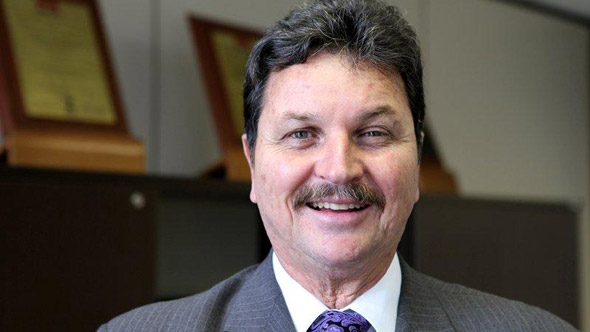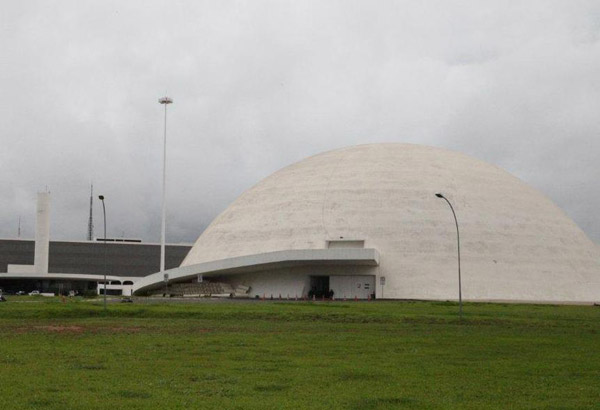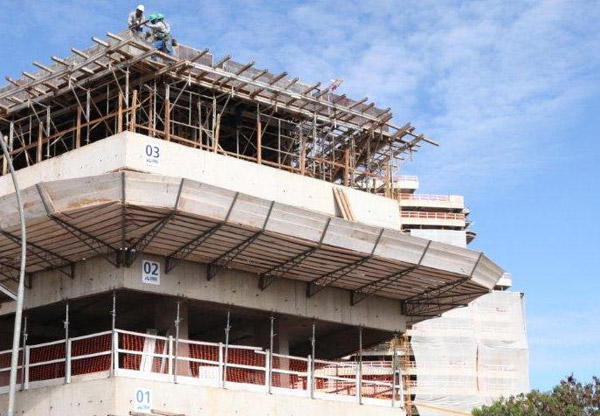Real Estate Sector in the Federal District
Antonio Carlos Lins, President of Terracap
The President of the State company Terracap, Antonio Carlos Lins, talks about the role of Terracap, the biggest real estate company in Brazil. He also talks about investment opportunities in the sector, challenges the idea of a “real estate bubble” and mentions some of Terracap’s projects.
Interview with Antonio Carlos Lins, President of Terracap

Could you present us your company – Terracap?
In terms of the real estate business, Brasilia has come ahead of several other Brazilian States such as Rio de Janeiro and Sao Paulo. The major companies are in Rio and Sao Paulo, but also have branches here in Brasilia, because they’re looking forward to this market, which has increased tremendously because of the GDP, among other factors.
It’s in fact a unique State company in Brazil, which has two partners: Distrito Federal (the Federal District), with 51%, and the Union (the Federal Government), with 49%. These are the two partners that make up the company. It’s a company that was founded in 1972. For the very first time, an important change of the legislation made us expand tremendously. Now, the company is allowed to make partnerships with the private sector to incorporate the land, which is owned by Terracap. Just to give you some idea, nearly 78% of the entire territory of Distrito Federal belongs to Terracap.
The prices of land here have increased tremendously recently, because of all the international interest in the country, usually aimed at the capital of the country, where most of the big decisions are taken.
The company realized that was necessary to expand its competency, not only making bids with the land for the private sector to acquire that. It was also necessary to open the possibility for the company to make partnerships with the private sector to incorporate its land. This has a double advantage, because the private sector won’t have the need to spend money acquiring the land, since that money could be invested directly into incorporating the land, just by making a partnership with Terracap. For that purpose, we’ll always have to have a minority of the shares of each venture that the company is inclined to go for, be it a shopping, or a big boulevard area.
So what does that mean for a real estate investor from Europe that sees an opportunity in Distrito Federal?
We are very open to possibilities. For instance, Distrito Federal has the intention to build an international financial centre in Brasilia, so we’d be calling for investors to come in and enjoy Terracap in this venture. The first advantage is that Terracap owns the land. Secondly, the investors don’t have to spend much money in acquiring the land, because it’s part of the venture. Terracap comes in and will make up in shares of the land and the investors will build up, get the infrastructure. In each case, there will be a specific company to be built in which Terracap will be a partner of the venture.
So, the investors keep the rights for a certain period of time? You’ll be the owners of the land and they’ll be the owners of the building?
A specific part of the land will be transferred to this new company in which Terracap is a partner. It could be that, in some cases, instead of transferring the ownership to this new company to be built, it could be made a long-term concession of the real estate. For each specific case, one will decide what’s best.
The most important thing is that there was never this kind of permission for a State company to do such things. We are not dealing with public service to be provided in the end for this partnership. Most of the private partnerships with the private sector had a public service to be provided, either a school, or a hospital, or a road. In this specific case, we could say it differs from the others, but we don’t have a recipe, we just have the permission to do so. We have to be creative in terms of what requirements should we put in that kind of tender to reach a specific company. Terracap can now be partner with several companies together with the private sector.
Has this sparked a lot of interest from the foreign investors? Where are they from?
I’ve been the head of the company for not too long, so I can’t tell you for the short period. But we have received contacts from South East Asia and other several countries. They have invited us to see their financial capabilities too. We are getting to know them, because we can’t afford to be partners with people who pretend to have financial and economical capabilities. In terms of the real estate business, Brasilia has come ahead of several other Brazilian States such as Rio de Janeiro and Sao Paulo. The major companies are in Rio and Sao Paulo, but also have branches here in Brasilia, because they’re looking forward to this market, which has increased tremendously because of the GDP, among other factors.
There are many new projects in Brasilia, for instance, a new stadium being built, which has received a sustainable certificate due to the use of recyclable materials. What sort of other projects will be available?
The stadium that you mentioned belongs to Terracap, as well as the Autodromo (Speedway), the Gymnasium, and the Digital Tower. We’ll have to open for concessions for exploring as well. The stadium is quite unique; we’ll produce solar energy not only for the stadium, being able to provide and sell energy outside the stadium. The stadium is a kind of arena, not only for sports, soccer games, but it can be used as a big shopping area, with zones for gastronomy and a huge covered parking area underneath. It’s a venue for religious and musical events. It has a big scope project and is in a very well-located area, close to the international convention centre, which will be linked through a tunnel to the stadium. The stadium will be completed by the end of this year.

This is one of the areas in which we are involved: making concessions to explore, which can be done through partnership with Terracap. This has opened up great opportunities for investors, especially for companies that have already the know-how to explore big arenas. All the preparation for the post-World Soccer Cup has to be done before the event. Businesses are welcome to set the ground for these concessions to be done in the near future.
Most of the countries have their embassies here in Brasilia, but not only for their business in Brazil, but also for their business in South America as a whole. Some of the countries do not have embassies in other countries in South America. That attracts investors to the area. Also, in terms of government related issues, they have to go through Brasilia.
There will be a technology park, which we’ll call Digital Capital. Most of the IT companies are eager to come to Brasilia, to an area with more than 1 million square meters. This is one example of investment with a specific purpose, mainly devoted to the IT area. Biddings will be carried on to select a private investor together with Terracap to develop this tech park. We’ve been contacted by Microsoft, Oracle, Cisco – all these major companies are interested to settle in Brasilia. They realize that most of the government decisions are made here, including international bids for technology softwares, so they are keen to have their research area established here.
For instance, Banco do Brasil and Caixa Economica Federal are already building in that area, investing more than R$ 4 billion reais. The project is going to be finished by May or June this year. We were the ones to provide the land for them to establish there.
Can you give us an overview of the real estate sector in Brazil?
Most of the private companies usually say that Terracap is the one that has the ‘raw material’ for them to work with. They cannot work if we don’t provide the raw material, which is the land. Depending on the kind of business or purpose for that land, there’s no interest from Terracap’s part in making a partnership with the private sector to explore residential or a specific commercial buildings and so forth. We can put this in a specific tender to be acquired and developed by the private sector directly.
However, once we talk about the big lands and projects such as an international financial centre, this is highly interesting. It’s of high value to us to become partners in this venture. Regarding the value of the land here, as I said earlier, because of the recent interest that has been developed toward the country, depending of the type of the investment, the rate of return has increased tremendously. It’s attractive for private investors to come to Brasilia and invest in the real estate business. They can add a lot of value by incorporating this big business.
Brasilia is a modern city and an international patrimony by Unesco (United Nations Educational, Scientific and Cultural Organisation). And the prices increase very much because of the regulation, since you cannot build wherever you wish to do so.
Let’s talk sustainability. Are there related initiatives on the way? Also, the increasing prices of residential property are spreading is the gap between rich and poor. How you are addressing this issue?
These issues are very important for this company. We have to be clever to avoid problems in separating the rich and the poor. As I mentioned before, because of Brasilia being a Unesco patrimony, you cannot afford to build wherever you want. We have to follow international rules that have not been imposed by Terracap. If you go to the outskirts of Brasilia, you’ll see that new areas of development have been somehow neglected in terms of price. I’m talking about Taguatinga, Samambaia, Ceilandia. These areas belong to the Federal District government and are having a real estate boom for housing and for industries. Somehow we are pushing the development to the outskirts, which have become highly attractive areas.
Some experts are saying that Brazil is having a ‘real estate bubble’. In your opinion, what are the real fundamentals? Is the sector healthy? What drives this market?
First of all, to be able to say that there’s a bubble in the real estate industry in Brazil, one would have to be able to say how many mortgages and re-loans are there – this is what creates bubbles. If you own a residential area and make a mortgage with the bank and put that residential house in the market and starts spending money in something else, this is what builds a bubble. In what percentage this happens in the real estate market in Brazil? Near to zero. I would challenge someone to actually prove that there’s a bubble in this business here. Someone has to come up with real data.
The best example of a ‘bubble’ is what happened in the United States. Here, in fact, there’s a high control of the housing market. There are mortgages for acquiring your residential area, but not a re-loan (or another mortgage) to spend in something else. We actually make a mortgage to buy our own houses, which is legitimate, but this does not generate any bubble. If any citizen needs to buy his own house, he can go for a mortgage. However, if he goes beyond that, once he has already acquired his house, and then he puts that in the market to acquire money to spend somewhere else, to increase his standard of living or to acquire another house, it can generate a bubble. Basically, you already own a house, but you go for a mortgage and put your house as a guarantee to obtain more money to spend somewhere else. There’s a collateral effect. The bubble is an artificial way to increase the demand for real estate.
Here, we have a real demand and people’s purchasing power has increased. These have brought the prices up higher.

The bureaucracy in general can make it difficult for a foreign company to invest in Brazil. What’s your opinion? Would you say that real estate in Brasilia is more advanced than in other Brazilian regions?
Here it’s more regulated than in other parts of the country, since you have a State company that owns the raw material, regulated through tenders. I’m talking mainly about new incorporations, new developments, and not about used houses already in the market. We cannot sell directly any of our areas; they have to go through tenders. Every month, we have a tender. We take an area, urbanize it, divide it into small areas, and sell these on a public bid or tender. We establish a minimum price, according to the market expectations, and then the private sector will put their bids.
We have one new urban area here, Noroeste, considered to be highly modern in terms of green development. There, for instance, all the public lighting is LED. The litter is separated, there’s a specific way of collecting it and covering underneath the roads. In that area, the prices are high. It’s very close to a new park, called Burle Max, which we’re building. There’s more than 300 hectares of park attached to this area.
What challenges Terracap face at the moment?
Being a State company, anytime we want to find a partner, we have to go through a tender or a bid. This process takes some time. Companies and investors have to be able to compete and to bring several documents to prove that they can participate. It’s also very time consuming to finalize the proceedings we have to follow. So, these can be seen as negative aspects.
But, remember that Terracap was allowed to take partnerships with the private sector and to create new companies. These new companies are private, which means that they’ll be able to sell without having to follow all the rules established for the public sector. That does not mean that we are trying to mislead the public sector or cheat the rules. Once you create this new company or partnership, Terracap will have the minority of the shares, which means that it won’t be a public company anymore. This new venture will have to follow the private sector rules.